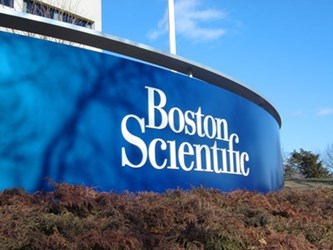Boston Scientific Wins FDA Clearance, CE Mark For TAVI/R Guidewire
By Jof Enriquez,
Follow me on Twitter @jofenriq

Boston Scientific has won U.S. Food and Drug Administration (FDA) and CE Mark approval for its second-generation Safari2 Guidewire, used in the placement of commercially available transcatheter aortic valve implantation or replacement (TAVI/R) devices.
“Having a pre-shaped, universal TAVR guidewire helps physicians deliver the replacement valve with reliability and consistency,” said Wesley Pederson, M.D., director of Valve and Structural Heart Disease at the Minneapolis Heart Institute, in the announcement.
Safari2 Guidewire is available in three curve choices, including an extra small curve for patient with smaller ventricles, which the company describes as an area of unmet clinical need.
“This is a wonderful development to have a smaller curve size so that we can offer this less invasive treatment option to a broader range of patients because valvular disease can have a devastating impact on patient survival and quality of life,” Pederson added.
Prior to the introduction of Boston Scientific's original Safari Guidewire, cardiologists depended on peripheral intervention guidewires that were manually shaped for TAVI/R procedures. The Safari Guidewire was the first pre-shaped guidewire for use within the chambers of the heart, and the next iteration Safari2 guidewire, with its three curve sizes, offers even more precision.
“The Safari2 Guidewire reflects our dedication and our commitment to meaningful innovation in the treatment of structural heart disorders,” said Tom Fleming, vice president and general manager, Structural Heart, Boston Scientific, in the statement. “We will continue to invest in technologies like Safari2 which facilitate successful TAVI/R outcomes and improve quality of life for patients with valvular disease worldwide.”
Safari2 Guidewire is compatible with all TAVI/R devices, including Boston Scientific's Lotus Valve System. Lotus gained CE Mark approval in October 2013, according to the company statement. It is an investigational device in the United States, where the REPRISE III clinical trial is being conducted to test the device's safety and effectiveness.
An earlier trial for the same device, REPRISE II, demonstrated sustained safety and effectiveness outcomes over six months, with only 1.1 percent of patients having moderate paravalvular aortic regurgitation (leakage) as assessed by an independent core laboratory.
In its latest earnings report, Boston Scientific touted further evidence of the performance, safety, and extremely low paravalvular aortic regurgitation rates of the Lotus system, based on the RESPOND Post-Market Study highlighted at EuroPCR 2015.
According to the Minneapolis Star Tribune, Boston Scientific also reported that the Lotus system, along with the FDA-approved Watchman anti-stroke device, helped sustain the company to 6 percent constant-currency revenue growth through four straight quarters. Strong sales of the cardiovascular devices business, to which the aforementioned new products belong, helped offset tepid sales by the heart rhythm management division, which manufactures pacemakers and defibrillators.
